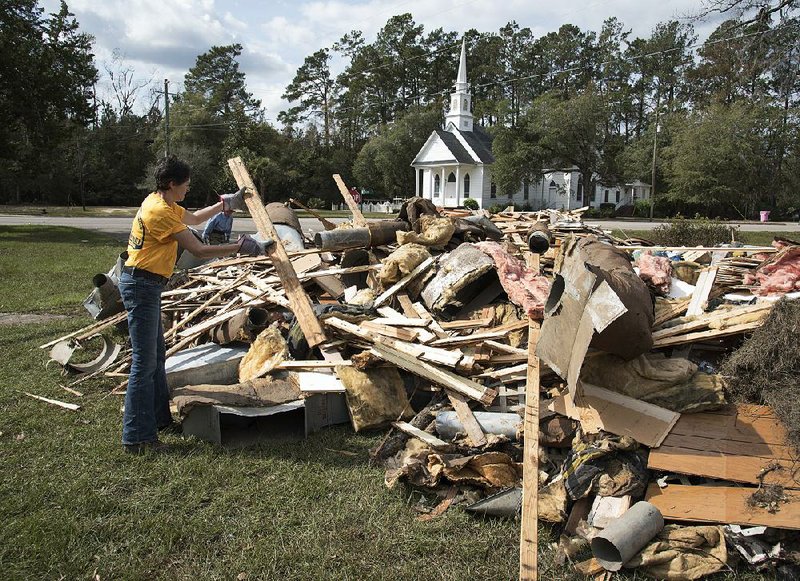NICHOLS, S.C. -- Nearly a month since floodwaters consumed the Mayberry-like hamlet of Nichols in rural South Carolina, few have returned. The fear is that many never will.
Nichols wasn't directly hit by Hurricane Matthew, but its location 50 miles inland from Myrtle Beach, between two converging rivers, caused it to fill up like a bathtub after 18 inches of rain fell.
A stew of water, fuel, fertilizer and sewage settled in homes for more than a week. As the water receded, toxic black mold left nearly all of the town's 261 homes uninhabitable. Brown lines, which start in the middle of once-white doors and get increasingly darker closer to the floor, show how the receding water "got nastier and nastier," said the Rev. Eddie Collier, pastor of Nichols' Methodist church.
He knew he was in trouble when he woke up in bed about 3:15 a.m. Oct. 10, and his hand hit water. His wife's cellphone had just enough power to make one call, and they were rescued by boat several hours later.
While waiting for help, he opened a window.
"But the odor was horrific," Collier said. "I actually closed the window back."
His is among homes already gutted to the studs, thanks to the help of church volunteers and AmeriCorps members. Many more need to be gutted. Collier said he's encouraging parishioners and neighbors to return to clean out. The longer they wait, the more unsalvageable their homes will be, he said.
He saw one set of neighbors briefly: "They threw up their hands and left. I haven't seen them since."
Most of the people in town recently were there only for the cleanup process. Lifetimes' worth of belongings was piled high along the streets. On some, the stench of molded furniture, wood and carpeting mixed with rotting food in garbage bags, waiting to be hauled off.
Looking at a yard full of trashed belongings, Bill Gleason got choked up as he motioned to family photos.
"I'm fine except when I talk about the pictures," he said.
He and his wife, who recently got a job with a propane gas company in Nichols, moved in two weeks before 2½ feet of contaminated water consumed their home. "I just sunk pretty much everything I had into renovating this place," he said. They're not coming back.
Nothing's been done at James Jones' home. The 69-year-old Vietnam veteran said he can't even walk inside because of his respiratory problems. He tried to get help through Veterans Affairs, he said, but was told he doesn't qualify for homeless assistance since he owns a home.
"We're in bad shape," he said. He and his wife left the shelter last Thursday to live with a nephew.
Few residents, if any, had flood insurance. And the Federal Emergency Management Agency is offering loans, not direct aid.
Mayor Lawson Battle said he worries about "the citizens who couldn't make ends meet before this happened."
Most of the town's 400 residents are retired or disabled, and they can't afford to take out the low-interest loans FEMA offers, he said.
"These people are not getting the resources they need to even get back to town," he said, noting 300 vehicles also were ruined. "It's going to take a huge miracle to fix Nichols."
The town's six churches and all 22 businesses were flooded. Glass fronts along Main Street smashed from the pressure; 5½ feet of water inundated the pharmacy, washing away residents' prescriptions.
By last Friday, only a seed-cleaning business and auto mechanic shop had reopened.
"We're trying to salvage and get help to the farmers," said Nichols Farm Supply owner Jimmy Devers, 66, whose ancestor founded the town. He and his wife are living in their home's second floor: "I was lucky because it didn't get the whole house."
Devers said the gas station he partially owns will reopen, but he's unlikely to reopen the coin laundry, which was "struggling anyway."
Two weeks after the flood, the town's family doctor reopened elsewhere in Marion County. With 4,000 area patients, Dr. James Carroll said, he had no choice.
"I don't know what's going to happen to Nichols -- where they're going to get the money from," said Carroll, who hasn't decided whether to rebuild his home along the Little Pee Dee River. "I love the town -- loved practicing there -- but it forced me to do something fast."
Hazel Lee, a 63-year-old school cafeteria manager, thought she was nearing retirement.
"I can't now because it's like starting all over again," she said. "I had to throw away everything."
Standing outside the shell of her home of 40 years, she pointed to a refrigerator that floated into her yard from a neighbor's and a walk-in freezer that floated a half-mile from a grocery store. Staying with family members, she and her 72-year-old husband hope to eventually move back.
"It'll be like a ghost town," she said. "If I could afford it, I would relocate myself."
A Section on 11/06/2016

